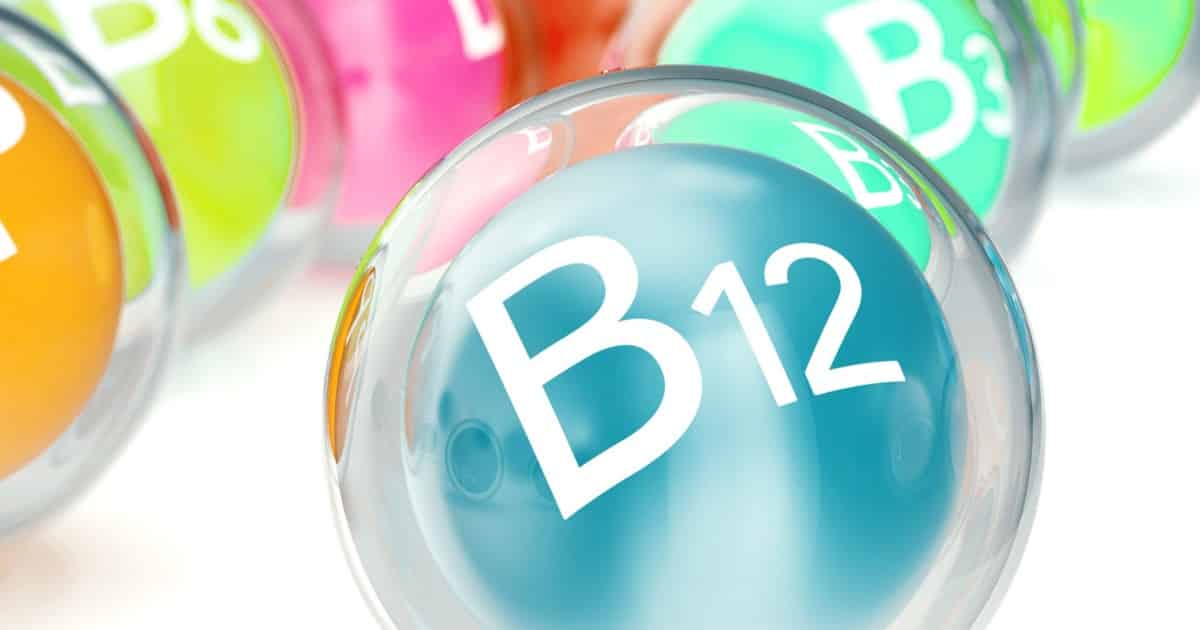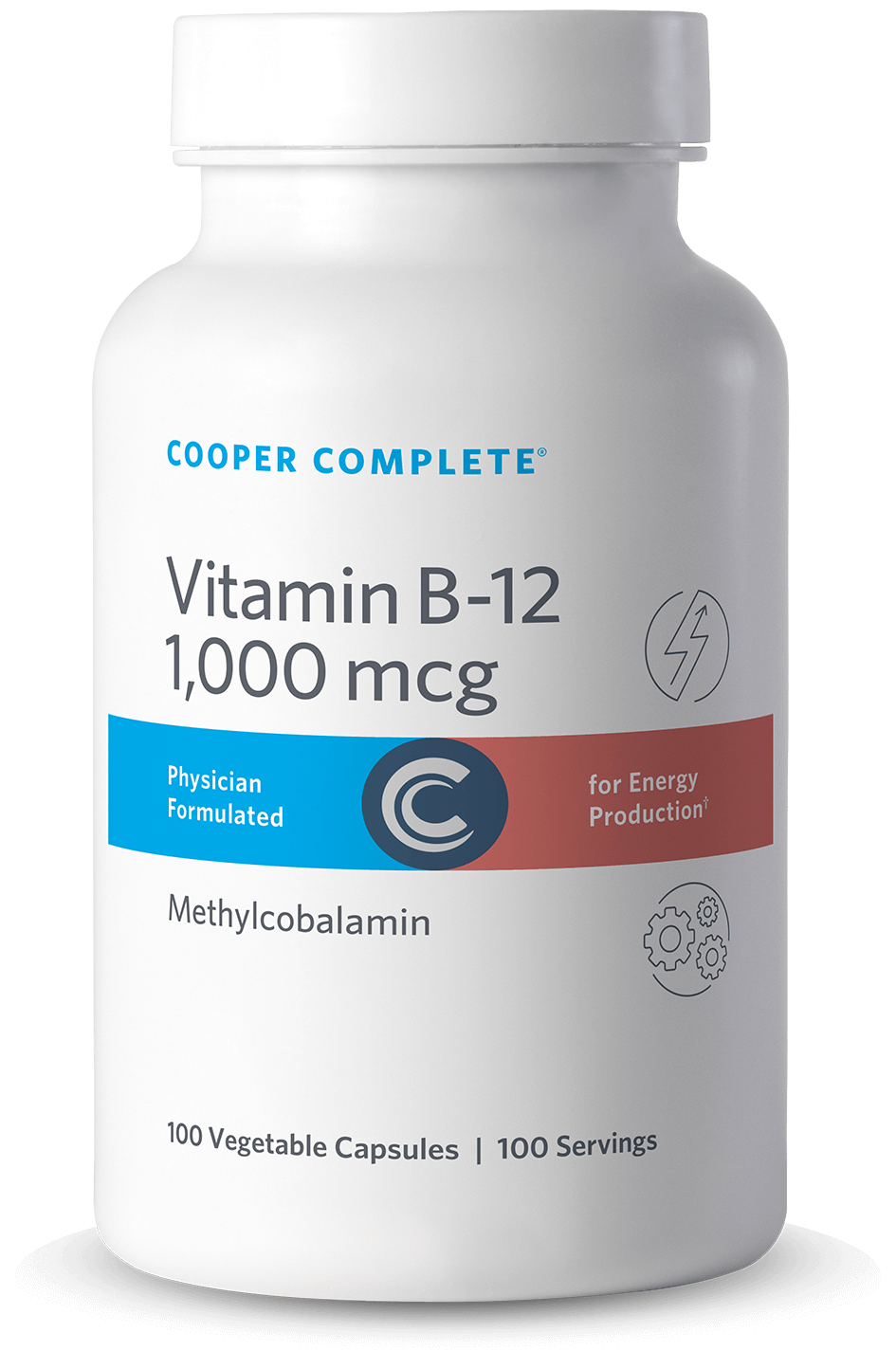Vitamin B12 Deficiency: Are You At Risk?

Vitamin B12 is one of many nutrients in the family of B vitamins. These B vitamins work together to help the body convert food into the fuel needed for daily use, so it is important to not have a B12 deficiency. Vitamin B12 individually is crucial for its role in DNA synthesis, normal brain function, and red blood cell production. The misconception of energy production stems from its role in helping every cell’s metabolism in the body. And while a deficiency of B12 can lead to tiredness or weakness, returning to healthy levels of B12 restores normal energy levels, but there is no evidence it will go further.
Unfortunately, vitamin B12 cannot be produced by the body and must be consumed through diet or supplementation. It is naturally found in animal products such as fish, poultry, meat, eggs and dairy. Commercial breakfast cereals are often fortified with Vitamin B12 (in the manufactured cyanocobalamin form), but the levels are typically quite low, well under 30 micrograms (mcg) per serving.
Yet despite these food sources, the NIH has found that up to 15% of the US public is deficient in B12.

Vitamin B12 Methylcobalamin Supplement 1000 mcg
Cooper Complete B12 Methylcobalamin Supplement contains the most active, absorbable form of vitamin B12 as it does not require conversion in the body. (Note: This product was previously offered in a liquid form.)
$19.98 Add to cartWho’s at Risk
While most of us consume enough B12 in our diet, deficiencies do occur. As most adults age, stomach acid levels decrease and reduce the number of nutrients absorbed. B12 is one of these nutrients, but typically eating fortified foods or taking a B12 supplement can negate this absorption loss. Many groups are at risk for deficiency as their conditions lower the body’s ability to absorb the nutrient when consumed. Digestive diseases also limit the amount of B12 the stomach can absorb. Individuals with Crohn’s and celiac disease often require additional B12 through food or supplements to maintain healthy levels. Also, anyone who has had weight loss surgery or another gastrointestinal surgery might develop issues absorbing enough B12 from a normal diet. If you feel you might fall into one of these categories, it is important to speak with your physician to have your B12 levels checked.
Lastly, vegetarians and vegans have a higher risk for deficiency as B12 food sources are only from animals. This finding was also reinforced by a study done comparing diabetic vegetarians and omnivores. Higher levels of inflammation were correlated with reduced levels of B12 in vegetarians. For anyone considering a plant-based diet, it is highly recommended to speak with your physician about nutrient levels to maintain a healthy lifestyle.
A strict vegan or vegetarian diet can be a risk factor for vitamin B12 deficiency as fewer or no animal products are consumed. As vegans don’t consume any food from animals, fortified foods and supplements are the only sources of vitamin B12 for vegans. In addition to this choice in diet, a vitamin B12 supplement is a good option to ensure adequate intake.
In contrast, for some people consuming enough B12 is not an issue. Instead, a reduction in stomach acid greatly impairs the body’s attempt to extract this nutrient from food. There are many reasons a person might be experiencing a reduction in stomach acid levels.
Here is a list of common reasons for low stomach acid:
- Older Adults with decreased stomach acids
- Regular use of proton pump inhibitors Prevacid® (lansoprazole), Prilosec® (omeprazole), and Nexium® (esomeprazole)
- Frequent antacid use
- Heavy drinking
- Gastrointestinal surgery, including weight loss surgery
- Pernicious anemia (an autoimmune disease)
- Gastrointestinal disorders such as Crohn’s or celiac disease
A person who fits the above categories should consult their physician about B12 levels in their blood.
Another common problem in determining B12 deficiency is the ability of folic acid to mask or hide this issue. Folic acid and B12 share roles in the body in creating red blood cells and caring for DNA. However, B12 has a very important unique function of maintaining proper brain function. While blood functions will most likely remain normal, a lack of B12 will impair the body’s ability to regulate brain function.
Vitamin B12 Benefits – Symptoms of Deficiency
A vitamin B12 deficiency can be confused with signs of aging for many. Symptoms of a B12 deficiency include:
- Memory issues
- Moodiness or depression
- Muscle weakness
- Extreme fatigue
- Low blood pressure
- Numbness or tingling in arms and legs
- Shakiness
- Unsteady gait
- Incontinence.
The only way to know if your B12 level is low is to get a blood test. A physician will determine what steps to take to raise blood levels appropriately. This often consists of a mix of solutions from dietary change, lifestyle change and supplements.
Contrary to popular opinion, increasing B12 intake past normal amounts does not increase energy levels. The NIH states specifically that “except in people with a vitamin B12 deficiency, no evidence shows that vitamin B12 supplements increase energy or improve athletic performance.”
Best foods to increase vitamin B12 levels
Improving B12 vitamin levels can be accomplished with a variety of foods, including:
- Fish and seafood
- Beef (especially liver)
- Poultry
- Nutritional yeast
- Eggs
- Milk, yogurt and cheese
- Fortified breakfast cereals
All B vitamins are water-soluble. Taking more of these vitamins than your body requires will cause the body to flush the excess through your digestive system. So, if you are spending extra money on B-complexes, energy drinks and other products to raise your B vitamin levels, your body will not be fooled — it only takes what it needs.
Many Vitamin B12 dietary supplements are in the cyanocobalamin form that the body must convert to the active methylcobalamin and 5-deoxyadenosylcobalamin form. All Cooper Complete products are in the methylcobalamin form. For those who need additional supplementation, we offer a physician-formulated Vitamin B12 methylcobalamin supplement that supplies 1000 micrograms (mcg) of Vitamin B12 in each serving.
